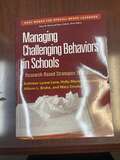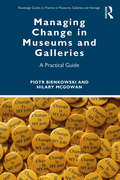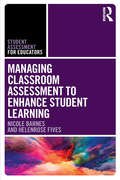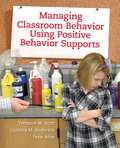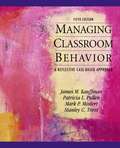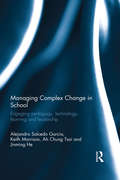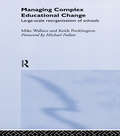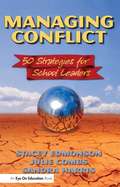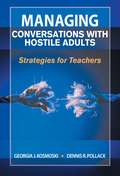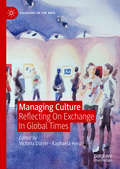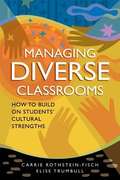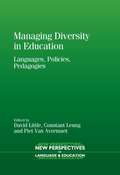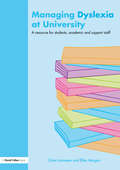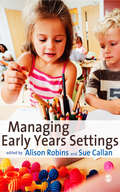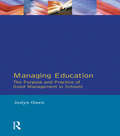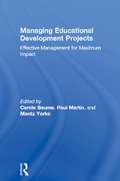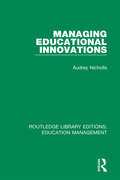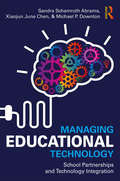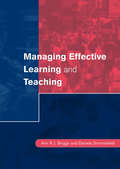- Table View
- List View
Managing Challenging Behaviors in Schools: Research-Based Strategies That Work
by Kathleen Lynne Lane Holly Mariah Menzies Allison L. Bruhn Mary CrnoboriSolidly grounded in research, this book provides an overview of tested, easy-to-implement strategies for preventing problem behavior in the classroom and responding effectively when it does occur. Part I focuses on prevention, discussing best practices in classroom management and instructional delivery. Part II covers more intensive interventions for students who require individualized behavior support. Chapters describe the use of behavioral contracts, self-monitoring, and functional assessment-based interventions. The authors' model is fully compatible with positive behavior intervention and support (PBIS) and response-to-intervention (RTI) frameworks. In a large-size format for easy photocopying, the book includes more than a dozen reproducible checklists, self-assessment tools, and planning forms. Purchasers get access to a Web page where they can download and print the reproducible materials.
Managing Change in Museums and Galleries: A Practical Guide (Routledge Guides to Practice in Museums, Galleries and Heritage)
by Piotr Bienkowski Hilary McGowanManaging Change in Museums and Galleries is the first practical book to provide guidance on how to deal with organisational change in museums, galleries or heritage organisations. Written by two authors who have direct experience of leading change, running change programmes and advising on change in more than 250 museums and galleries, the book identifies the various problems, issues and challenges that any professional in a museum or heritage organisation is likely to encounter and provides advice on how to deal with them. The book’s six parts treat change holistically, and help the reader understand what change entails, prepare for it and lead it, ensure that everyone in the museum is involved, understand what can go wrong and evaluate and learn from it. Each chapter is devoted to a specific challenge that is often encountered during change and is extensively cross-referenced to other relevant chapters. Including a list of helpful resources and suggestions of useful publications for further reading, this book is a unique guide to change in museums. Managing Change in Museums and Galleries is an essential resource for all museum practitioners – whether they be the people in museums and galleries who are leading change, or those affected by change as a leader, a member of staff or a volunteer.
Managing Change in Schools: A Practical Handbook
by Colin Newton Tony TarrantWritten by two educational psychologists, this essential aid shows how change can be managed to increase job satisfaction and avoid unnecessary stress and conflict. * offers practical advice for schools with action plans * outlines the mechanics and processes in self-appraisal * analyses the key methods for promoting effective change * shows ways to monitor, review and evaluate change * examines a number of strategies including consultation, negotiation, project development and in-service training
Managing Change: Bullet Guides
by Tina KonstantOpen this book and you will Overcome barriers Control costs Monitor progress Get results
Managing Change: Bullet Guides
by Tina KonstantOpen this book and you will Overcome barriers Control costs Monitor progress Get results
Managing Classroom Assessment to Enhance Student Learning (Student Assessment for Educators)
by Helenrose Fives Nicole BarnesAs teachers are required to integrate an increasing number of assessment practices into the classroom, it is crucial that they have effective routines for organizing and evaluating the generated data. Managing Classroom Assessment to Enhance Student Learning introduces pre- and in-service teachers to the major categories of assessment management and provides empirical and theoretical support for their effectiveness. In-depth chapters consider management in the context of assigning and collecting work, interpreting and organizing assessment results, and providing students with feedback.
Managing Classroom Behavior Using Positive Behavior Supports
by Terrance M. Scott Cynthia M. Anderson Peter AlterAn essential how-to guide to positive behavior support in schools, this text focuses on practical strategies for the classroom with step-by-step application examples.
Managing Classroom Behaviors: A Reflective Case-based Approach
by James M. Kauffman Patricia L. Pullen Mark P. Mostert Stanley C. TrentManaging Classroom Behavioris written for elementary, middle, and high school teachers, both generalandspecial educators, who are currently in training or already teaching in the classroom. Based entirely on empirical research and richly illustrated with numerous examples on how behavior is managed in the classroom, this popular case book is widely used in the education community. Giving its readers a real-world look at the subject, it provides the opportunity for teachers to practice applying principles of behavior management through the analysis of actual case studies, self-questioning, and reflection. All case studies are included-in full- in Part II of the text and portray teachers' actual experiences and opportunity for application by the reader. Widely diverse, the cases depict general and special educator, and describe students ranging from primary grades to high school. There are also multicultural cases and a discussion of multicultural issues. This updated edition features a new chapter on planning for the school year and managing the physical environment; a new special feature which makes direct and explicit links between chapters in Part I and specific cases in Part II; revised and updated case studies, with the inclusion ofallcase descriptions now in the text; reorganized inclusion of APA references and the APA Style Guide; and all chapters have gone through a thorough revision process.
Managing Classrooms and Student Behavior: A Response to Intervention Approach for Educators
by Stephen B. Richards Jennifer T. Christman Joni L. Baldwin Catherine Lawless FrankManaging Classrooms and Student Behavior provides the essential information necessary for understanding and applying classroom and behavior management techniques with a Response to Intervention (RTI) approach. The presentation and application of information more closely resembles the actual decision-making approaches used by individuals and teams of teachers, schools, and districts. This introductory, reader-friendly textbook can be used in undergraduate or graduate level courses with special education or both special and general education candidates. A companion website provides key ancillary materials such as PowerPoint presentations, a test bank, and an instructor’s manual.
Managing Climate Change and Sustainability through Behavioural Transformation (Sustainable Development Goals Series)
by Parul RishiThis book addresses climate change and sustainability management from a transdisciplinary perspective which encompasses within itself how different humanistic disciplines can culminate with each other to move ahead with the agenda. Issues of adapting to climate change and sustainability management have been gaining global prominence over the past few decades. There have also been volumes of literature that highlight the technical dimensions of climate change and sustainability across regions and cultures. However, they have had limited strength to bring direct and desirable impact in promoting pro-climate action and sustainability behaviour. The major reason for this is limited inclusion of pluralistic perspectives into human cognition and affect, and resultant limited public acceptability. Although behavioural science as a discipline has taken a front seat in promoting behavioural transformation, the book argues that other humanistic fields of understanding like education, art, literature, philosophy, political science, sociology, economics, etc., have to be integrated in order to present a holistic standpoint to sustainability literature.
Managing Complex Change in School: Engaging pedagogy, technology, learning and leadership
by Keith Morrison Alejandro Salcedo Garcia Ah Chung Tsoi Jinming HeLeading and managing change in schools is a complex topic. In this timely book the authors take the reader through a journey of how to lead and manage multidimensional change in order to create engaged learners, teachers, leaders and managers. They provide a readable and straightforward account of a major, high-profile innovation in one school and draw from it key lessons for leaders and managers of change in schools. Managing Complex Change in School synthesizes a wealth of literature and research on managing change, and shows how the emerging field of complexity theory can inform the effective management of multidimensional change. Arising from an in-depth, mixed methods evaluation of the key school, this book is practice-focused and is an invaluable companion for practitioners handling positive change in schools.
Managing Complex Educational Change: Large Scale Reorganisation of Schools
by Michael Wallace Keith PocklingtonWhy is educational change becoming more complex? Are there patterns in this complexity? How may managers cope effectively with complex educational change?This book investigates initiatives to reorganise school systems, involving highly emotive closures and mergers. It reveals how reorganisation was a complex change to manage because it was large-scale, componential, systematic, differentially impacting and context dependent. These characteristics affected management tasks, generating ambiguity in the change process that limited managers' capacity to control it. The authors offer four management themes as realistic strategies for coping with complex educational change:*orchestration*flexible planning and coordination*culture building and communication*differentiated supportManaging Complex Educational Change is essential reading for all concerned with educational change - managers in schools and colleges, students on advanced courses, trainers, local and regional administrators, academics and policy makers. The research has general implications for the theory and practice of managing complex change.
Managing Conflict: 50 Strategies for School Leaders
by Sandra Harris Stacey Edmonson Julie CombsThis book offers 50 easy-to-read strategies for managing conflicts in your school involving students, parents, and teachers. Individually, these strategies provide specific insights into conflict resolution, reduction, and management. As a whole, the 50 strategies provide a comprehensive method to lead constructive change in your school. With quotes, examples, and reflection questions, this book offers ideas that help you lead with confidence.
Managing Conversations with Hostile Adults: Strategies for Teachers
by Dennis R. Pollack Georgia J. KosmoskiTeachers: Now you can identify and apply the proven strategies to deal successfully with hostile adults in schools.Skill in communicating is essential for teachers--and now the wisdom of your colleagues can help you to deal with one of your most difficult challenges: hostile adults.In this hard-hitting and supremely practical book, the authors draw from the actual experience of more than 250 practicing teachers to bring you the advice and insight you need. They begin with data from a two-year study that includes surveys and in-depth interviews with practicing teachers and certified school support professionals from urban, suburban, and rural schools at all socio-economic levels. The final product is a comprehensive and highly applicable resource filled with true-to-life vignettes and practical, real-world analysis, including:* Defusing the angry screamer* Serving as mediator* Handling parents with blinders* Curbing school gossip* Dealing with public humiliation* Neutralizing the influence of drugs or alcohol* Maintaining confidentialityThis book is a valuable and insightful resource that can take you from reactive to proactive. A not-to-be-missed tool for savvy teachers at all levels.
Managing Culture: Reflecting On Exchange In Global Times (Sociology of the Arts)
by Raphaela Henze Victoria DurrerThis book provides new insights into the relationship of the field of arts and cultural management and cultural rights on a global scale.Globalisation and internationalisation have facilitated new forms for exchange between individuals, professions, groups, localities and nations in arts and cultural management. Such exchanges take place through the devising, programming, exhibition, staging, marketing, and administration of project activities. They also take place through teaching and learning within higher education and cultural institutions, which are now internationalised practices themselves. With a focus on the fine, visual and performing arts, the book positions arts and cultural management educators and practitioners as active agents whose decisions, actions and interactions represent how we, as a society, approach, relate to, and understand ourselves and others. This consideration of education and practice as socialisation processes with global, political and social implications will be an invaluable resource to academics, practitioners and students engaging in arts and cultural management, cultural policy, cultural sociology, global and postcolonial studies.
Managing Discipline in Schools
by Sonia BlandfordThe management of discipline is an essential element in educational practice, and at a time when teachers and managers are anxious about reported increases in violence and other forms of anti-social behaviour there's a need for practical guidance and a review of current thinking. Based on the author's experience and research in a range of secondary and primary schools, this book presents accessible summaries of relevant legislation and guides the reader through management theories towards effective practice. By placing the teacher at the centre of the management of discipline in schools and focusing on teacher and pupil esteem, a disciplined environment is not only desirable, but achievable too. Written in an accessible style, the book; * highlights the real problems and offers real solutions * includes case-studies, recent research and legislation * considers the classroom as well as the whole-school context * describes the support networks within education * provides a multi-agency approach. This book is aimed at trainee and practising teachers, managers, and all those who work with children.
Managing Diverse Classrooms: How to Build on Students' Cultural Strengths
by Carrie Rothstein Fisch Elise TrumbullThe authors present a simple framework for understanding cultural differences, comparing the "individualistic" culture that prevails in American education with the "collectivistic" culture that characterizes most of the world's population, including many of the Latino immigrant students in U.S. classrooms.
Managing Diversity in Education
by David Little Constant LeungDiversity - social, cultural, linguistic and ethnic - poses a challenge to all educational systems. Some authorities, schools and teachers look upon it as a problem, an obstacle to the achievement of national educational goals, while for others it offers new opportunities. Successive PISA reports have laid bare the relative lack of success in addressing the needs of diverse school populations and helping children develop the competences they need to succeed in society. The book is divided into three parts that deal in turn with policy and its implications, pedagogical practice, and responses to the challenge of diversity that go beyond the language of schooling. This volume features the latest research from eight different countries, and will appeal to anyone involved in the educational integration of immigrant children and adolescents.
Managing Dyslexia at University: A Resource for Students, Academic and Support Staff
by Ellen Morgan Claire JamiesonA thorough and comprehensive guide for both education professionals and those affected by dyslexia, this book is predominantly a guidebook. It includes lots of practical advice and is based on the authors’ sound knowledge of current theory and practice. It includes: photocopiable materials contact and reference details personal organisation advice ways forward for potential problems information on secondary or associated difficulties.
Managing Early Years Settings: Supporting and Leading Teams
by Mrs Alison Robins Ms Sue Callan'This book is a very useful resource for setting leaders undertaking advanced study, such as Early Years Professional Status and the National Professional Qualification in Integrated Centre Leadership...[I]t is also an interesting and up-to-date reference tool for qualified managers and leaders of early years settings, large and small, in all sectors' - Early Years Update 'Through discussion points and case studies, the authors explore the key skills and techniques necessary to effectively lead and manage an early years setting - Nursery Education Plus, as part of their 'Ten of the Best early years professional books' feature. `This book will make a relevant and helpful contribution in enabling practitioners to explore and understand the different ways in which they can lead and manage across a diverse range of settings and at different levels. Through helpful discussion points and case studies, the book will encourage practitioners to consider both theory and practice, including value based practice and the skills required for working within a new multi-disciplinary environment. A welcome and accessible text for early years practitioners facing the challenges and demands of this new agenda' - Professor Linda Miller, Professor of Early Years, The Open University Firmly grounded in practice, this book puts children and families at the centre of good early years leadership. There is now considerable emphasis on leadership skills in this sector, as the workforce becomes increasingly professionalized. The following are considered: - changes and developments within the early years sector - the impact of good leadership on children and their families - effective practice in a variety of settings, including Children's Centres - value-based leadership, and inspirational leadership - meeting the challenges - managing change - inter-agency and multi-disciplinary working - working with families and parent groups. Useful features such as Activities for Continuing Professional Development, Questions for Reflection and Pictures of Practice appear throughout the book. Those studying for Foundation Degrees, leaders undertaking the National Professional Qualification for Integrated Centre Leadership (NPQICL), those undertaking the management modules for Early Years Professional Status (EYPS) and anyone studying Childhood and Early Childhood will find this book an invaluable aid.
Managing Education: The Purpose and Practice of Good Management in Schools
by Joslyn OwenThe 1988 Education Reform Act meant that schools had to manage themselves in ways which satisfied the world outside the school gates. Governors become more powerful, parents took on a greater influence and employers were given new rights. This book discusses the total management of schools as they respond to these new imperatives. It examines the responsibilities of Teachers, Head Teachers and Principals as they shape and execute their management plans. Against the background of a compulsory National Curriculum, the book also examines the management of the diverse pressures within the curriculum itself.
Managing Educational Development Projects: Effective Management for Maximum Impact (SEDA Series)
by Paul Martin Mantz Yorke Carole BaumeEducational development is a major issue for higher education institutions (HEIs). It constitutes a major part of the research work of many academics. This practical volume, written by experienced practitioners in the field, is a guide to successfully managing an educational development project.
Managing Educational Innovations (Routledge Library Editions: Education Management #17)
by Audrey NichollsOriginally published in 1983. This book deals with theories of innovation and activities of innovating and the relationships between them, and will help to clarify some of the underlying theories and enable practitioners to make a more professional response to the demands and pressures for innovation. The book analyses some case studies of educational innovations carried out on both sides of the Atlantic and suggests what lessons might be learned from them. It stresses the importance of the active involvement of teachers in the decision-making process and emphasises the importance of a rigorous and broadly based evaluation of innovation. The controversial issue of the use of external consultants in schools is discussed. Written in a clear style, free from jargon, theories are not discussed in isolation or for their own sake, but are applied and related to educational practice.
Managing Educational Technology: School Partnerships and Technology Integration
by Sandra Schamroth Abrams Xiaojun June Chen Michael P. DowntonManaging Educational Technology: School Partnerships and Technology Integration by Sandra Schamroth Abrams, Xiaojun June Chen, and Michael P. Downton. Sandra Schamroth Abrams is an associate professor in the Department of Curriculum and Instruction at St. John’s University, USA. Xiaojun Chen is an associate professor of educational technologies in the Department of Curriculum and Instruction at St. John’s University, USA. Michael P. Downton is an assistant professor in the Department of Curriculum and Instruction at St. John’s University, USA.
Managing Effective Learning and Teaching (Educational Management Research and Practice Series)
by Ann Briggs Daniela SommefeldtPresenting the theory underlying management of teaching and learning, as well as discussion of good practice in schools and colleges, the authors of this volume discuss the rationale for learning and teaching though a consideration of curriculum design. This is linked to models of learning and teaching, and the management of contexts for learning, together with the roles and responsibilities of curriculum managers. Examples are drawn from international settings as well as from the United Kingdom, encouraging the reader to explore the context of managing learning and teaching within his/her own institution. The authors provide self-study material, with extensive links to other key texts in the field. This book is a valuable source book for curriculum managers at all levels in schools and colleges, as well as a course book for Masters' level study in educational management
